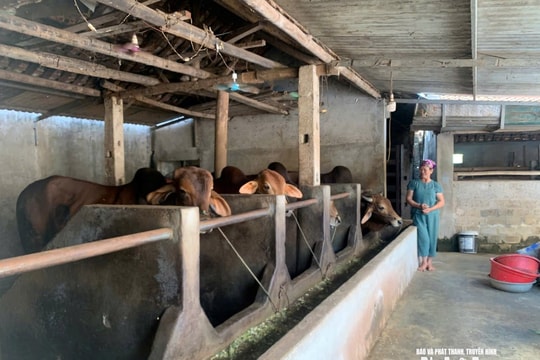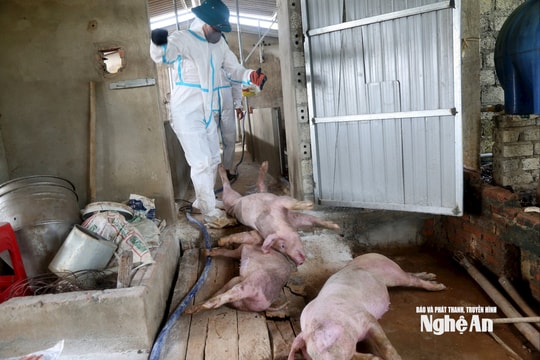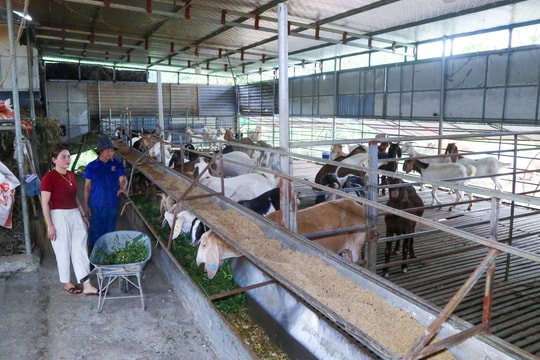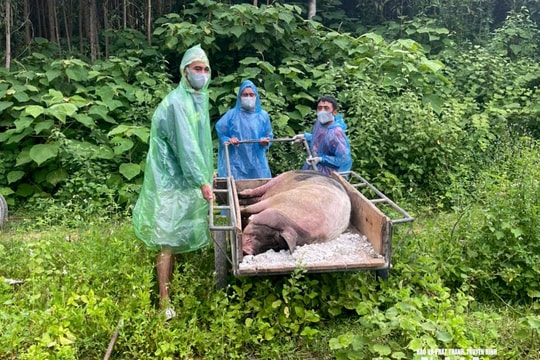African swine fever outbreak announced in Quynh Luu (Nghe An)
(Baonghean.vn) - A family in Quynh My commune, Quynh Luu district (Nghe An) bought pork from a butcher in the commune to eat. Four days later, the family's pigs died and tested positive for African swine fever.
Nghe An Newspaper had an interview with Mr. Ngo Duc Quynh - Deputy Head of the Provincial Veterinary Department about the discovery of an outbreak of African swine fever in hamlet 7, Quynh My commune, Quynh Luu district.
African swine fever outbreak announcement
PV:Currently, swine fever has appeared in Quynh My commune, Quynh Luu district. Could you please tell us the specific situation of the epidemic?
Mr. Ngo Duc Quynh:On March 10, 2019, the Quynh Luu District Animal Husbandry and Veterinary Station received a report on the situation of sick and dead pigs at Mr. Hoang Van L.'s household in Hamlet 7, Quynh My Commune. After inspection, the Animal Husbandry and Veterinary Station reported to the leaders of the Quynh Luu District People's Committee and the Department of Animal Husbandry and Veterinary. At the same time, samples were taken and sent to the Department of Veterinary Medicine Region III.
 |
| Mr. Ngo Duc Quynh - Deputy Head of the Provincial Veterinary Department. Photo by Viet Phuong |
The test results were positive for the virus causing African swine fever. Immediately after the test results were available, the leaders of Nghe An Provincial People's Committee, the Department of Agriculture and Rural Development, the Department of Animal Husbandry and Veterinary Medicine worked with the People's Committee of Quynh Luu District and the People's Committee of Quynh My Commune to synchronously deploy anti-epidemic solutions. Directed the immediate destruction of all infected pigs (22 pigs, including 2 sows and 20 piglets) according to technical procedures.
PV:Could you tell us how the epidemic prevention work is going now?
Mr. Ngo Duc Quynh:Regarding the outbreak in Quynh My commune (Quynh Luu), we have synchronously deployed anti-epidemic solutions; destroyed all sick pigs, isolated the outbreak, sprayed chemicals and lime powder to disinfect households in hamlet 7 and adjacent hamlets, and increased surveillance.
Currently, Quynh Luu district has set up two checkpoints in Quynh My commune to prevent households from buying, selling, and transporting pigs in and out of the commune, to prevent the spread of the disease.
The Department of Animal Husbandry and Veterinary Medicine also provided chemicals, disposable protective gear, and motor sprayers for Quynh Luu district to deploy epidemic prevention.
PV:Quynh My is not a locality bordering Thanh Hoa - the area where the epidemic occurred, so why did the outbreak occur in the commune?
Mr. Ngo Duc Quynh:Quynh Luu district currently has 42 thousand pigs, of which 36 farms and concentrated farms account for 22.5% of the total pig herd in the district. There are more than 87 households slaughtering 1-3 pigs per day and night, mainly at home.
The household with this herd of pigs infected with the disease is located at the foot of the hill in Hamlet 7 - far from residential areas and the main roads of the province and district; this sow has been raised for 11 years so no one expected it to be the place where the disease was discovered.Initial information suggests that the household may have bought pork from a local butcher four days before the pig died. The specific cause is being investigated by the authorities.
Currently, Quynh Luu district has issued a decision to announce African swine fever in Quynh My commune.
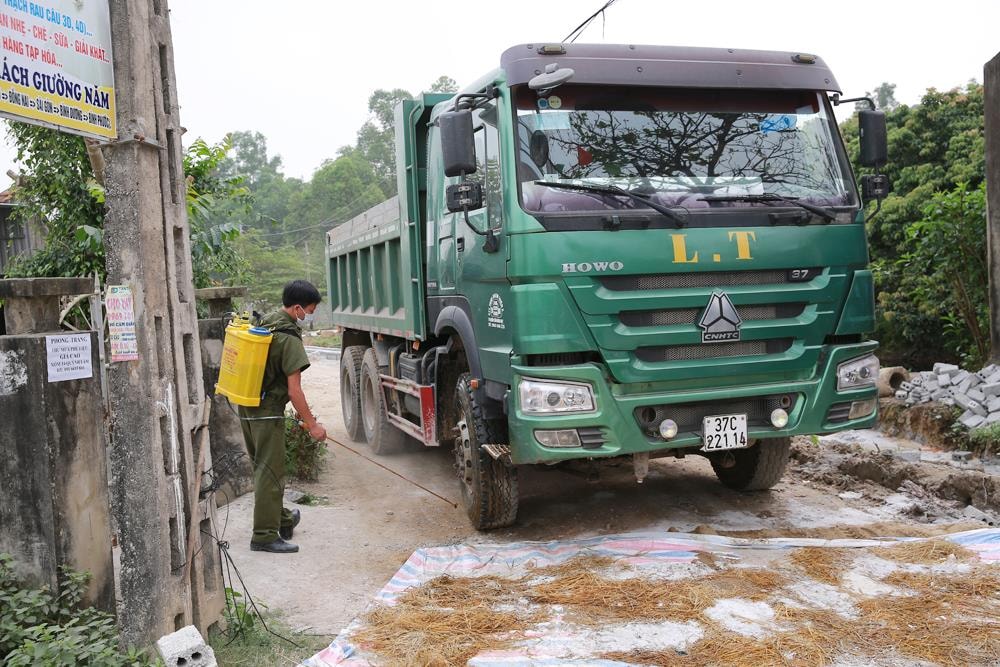 |
| Spraying African swine fever prevention medicine on vehicles entering and exiting the epidemic area in Quynh My commune (Quynh Luu). Photo: Lam Tung |
PV:Thus, mAlthough the authorities have actively participated in the prevention of African swine fever, the disease has appeared in the pig herd in the province. Could you please tell us about the difficulties?in the process of disease prevention and control?
Mr. Ngo Duc Quynh:Nghe An has a large herd of livestock and poultry, the whole province has more than 740 thousand buffaloes and cows, ranking first in the country; nearly 900 thousand pigs, ranking 5th in the country and nearly 22.5 million poultry, ranking 4th in the country.
Household farming accounts for 70.3% of the total pig herd; meanwhile, the number of households slaughtering 1-3 pigs/day and night is over 1,000 households. The rate of pigs slaughtered at households accounts for 80%.
In the province, there are many roads, railways, airways, sea routes, inland waterways; animal trading activities occur frequently, there are many livestock markets; household and small-scale livestock farming accounts for the majority... therefore, disease control work faces many difficulties. And with the characteristics of livestock farming in Nghe An, people's awareness in disease prevention work is extremely important and decisive.
 |
| People sprinkle lime powder to disinfect livestock barns to prevent swine fever. Photo: Quang An |
The danger of African swine fever is that 100% of infected pigs die, and there is no vaccine or treatment in the world. The only current measure when there is an epidemic is to destroy sick pigs and thoroughly disinfect to prevent the disease from spreading. Therefore, pig breeders, traders, and slaughterers must strictly implement the "5 no's": do not hide the epidemic; do not buy, sell, or transport sick or dead pigs; do not slaughter or consume sick or dead pigs; do not throw dead pigs into the environment; and do not use unheated leftover food.
Unlike many other diseases, African swine fever pathogens survive for a long time in the environment, so when destroying them, strict procedures must be followed to limit the spread of pathogens into the environment, which is extremely dangerous..
Do not boycott the consumption of safe pork products.
PV:With the news of African swine fever, consumers are worried about not using this food, causing many small traders and farmers to fall into difficult situations. So what do you recommend?
Mr. Ngo Duc Quynh:Currently, the entire political system, veterinary agencies, agriculture and rural development sectors are struggling to fight the African swine fever that is spreading in Vietnam, causing losses to the economy and directly affecting farmers. However, some individuals, due to lack of knowledge, have spread false messages, boycotting processed pork products. That will negatively affect the livestock industry and, more dangerously, can push farmers into a deadlock and bankruptcy.
According to the Department of Preventive Medicine (Ministry of Health), this epidemic does not cause illness in humans, so people need to stay calm and not panic and boycott the consumption of safe pork products that are not infected with the epidemic and are processed hygienically.
According to information from the World Organization for Animal Health (OIE) and the Food and Agriculture Organization of the United Nations (FAO), since 2017, 20 countries have reported African swine fever, with a total of over 1.08 million pigs forced to be destroyed. In China, from August 3, 2018 to March 8, 2019, 112 outbreaks were detected in 28 provinces, with more than 950,000 infected pigs having to be destroyed; many of these outbreaks occurred in Yunnan and Guangdong provinces bordering Vietnam.
In Vietnam: From February 1 to March 13, 2019, African swine fever occurred in 17 provinces and cities (Hung Yen, Thai Binh, Hai Phong, Thanh Hoa, Hanoi, Hai Duong, Ha Nam, Hoa Binh, Dien Bien, Thai Nguyen, Quang Ninh, Ninh Binh, Nam Dinh, Lang Son, Bac Can, Son La and Nghe An), the total number of pigs that had to be destroyed was more than 16,000.


